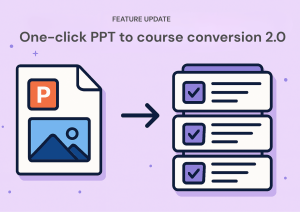
Benefits of Custom e Learning Solutions for Best Outcomes
- Author: Urban Rotar
- Published:
What Is a Custom eLearning Solution?
A custom elearning solution is a tailored training program created to meet the specific needs and objectives of an organization. Unlike generic off-the-shelf courses, these customized e learning solutions are developed from scratch, ensuring that content, interactivity, and assessments align with your company’s culture, job roles, and strategic goals. This approach not only enhances learner engagement and retention but also provides the flexibility to update or scale courses as needed.
Benefits of Customized e Learning Solutions
Customized eLearning solutions are like having a personal coach for your organization’s learning journey. They deliver training that not only informs but also inspires. By aligning every module with your specific needs, these solutions create a learning experience that feels personal, engaging, and transformative.
In short, custom elearning solutions provide:
- Highly Relevant Content: Every lesson is designed with your unique challenges and goals in mind.
- Enhanced Engagement: Interactive elements make learning dynamic and memorable.
- Rapid Adaptability: Courses can be quickly updated to reflect changes in your industry or business.
- Improved Retention: Personalized paths and practical applications ensure learners truly absorb and apply new knowledge.
How Custom eLearning Solutions Differ from Standard Courses
Traditional eLearning programs often rely on one-size-fits-all content that may not address the specific needs of your workforce. Customized e-learning solutions, on the other hand, provide:
- Personalized Experiences: Content is built around your company’s unique processes and culture.
- Flexible Updates: Courses can be modified quickly as your business evolves.
- Targeted Learning Paths: Training that directly addresses the skills and knowledge gaps within your team.
- Maximized ROI: By focusing on what matters most to your organization, these solutions drive better performance and measurable success.

Comparing Coursly to Other Leading eLearning Brands
When it comes to elearning custom solutions, several platforms are available. Here’s how Coursly compares to other well-known tools:
Coursly
- Speed & Efficiency:
Coursly leverages AI to generate SCORM-compliant courses in minutes. This rapid turnaround is perfect for organizations that need to update training quickly. - User-Friendly:
Its intuitive interface makes it easy for non-technical users to create high-quality, interactive courses. - True Customization:
From converting PPTs and PDFs into engaging courses to generating tailored quizzes, Coursly offers genuine customized elearning solutions that can be adapted to any learning need. - Cost-Effective:
With a pricing structure designed for speed and efficiency, Coursly helps you save time and resources while achieving a higher ROI.

- Robust Functionality:
Offers deep customization and interactivity, ideal for complex learning scenarios. - Steep Learning Curve:
Requires significant training, which can slow down updates. - Suite Integration:
Works best within the Articulate 360 ecosystem, but may lack the agility needed for rapid changes.

- Advanced Capabilities:
Excels at creating multimedia-rich and responsive content, including VR and simulations. - Complexity:
Its advanced features come with a steep learning curve and a more resource-intensive development process. - Flexibility:
While highly capable, it isn’t as quick or intuitive for delivering rapid, customized e-learning solutions.

- Ease of Use:
Its PowerPoint-based approach makes it accessible and easy to learn. - Moderate Customization:
Excellent for quickly converting existing presentations but may lack the dynamic customization of AI-driven tools. - Efficiency:
Ideal for organizations with moderate needs; however, for rapid, highly tailored course development, Coursly often delivers a faster turnaround.
Why Choose Coursly for a Custom eLearning Solutions?
In today’s fast-paced business environment, time is a precious commodity. Coursly transforms traditional course creation by using AI to streamline the process. Here’s why Coursly stands out:
- Rapid Course Generation:
Turn your ideas, documents, and existing assets into fully interactive courses in minutes. - Intuitive Customization:
Every element—from content tone to interactive quizzes—is easily tailored to your organization’s needs. - Seamless LMS Integration:
Courses are exported in SCORM format, ensuring compatibility with any LMS for smooth deployment and tracking. - Cost Efficiency:
Save time and reduce costs by automating much of the course creation process, allowing you to invest more in strategic growth.
Choosing the Right Customized eLearning Solution
Organizations looking to develop engaging, tailored training programs must carefully evaluate customized eLearning solutions. Factors like flexibility, personalization, and analytics are crucial to ensuring a solution aligns with your unique training objectives and learner needs.
Key Features to Look For
When selecting a customized eLearning Solution, consider the following essential features:
Personalization & Relevance: Tailored content that reflects your company’s goals and culture. Adaptive pathways allowing learners to focus on their specific needs.
Interactive & Multimedia-Ready: Quizzes, simulations, and scenario-based activities. Seamless integration of video, audio, and images for immersive experiences.
Scalability & Quick Updates: Ability to modify or expand content as your business evolves. Rapid authoring features to keep training current.
Analytics & Reporting Detailed learner progress tracking and performance insights
Popular eLearning Solutions in 2025
The top authoring tools for 2025 include:
- Coursly AI – AI-powered, fast, scalable, and best for corporate training and eLearning.
- Articulate 360 – An all-in-one solution designed for high-quality content creation and large teams.
- Adobe Captivate – A feature-rich tool that supports interactive, multimedia-heavy courses.
- iSpring Suite – A PowerPoint-based solution, ideal for small businesses and beginners.
- Elucidat – A cloud-based, highly scalable authoring tool for large enterprises.

Conclusion & Final Thoughts
Customized eLearning solutions are not just about training—they’re about transformation. By developing courses that speak directly to your organization’s needs, you create an environment where every lesson drives growth, enhances performance, and empowers your team. While platforms like Articulate Storyline 360, Adobe Captivate, and iSpring Suite have their strengths, Coursly’s AI-powered, rapid, and highly customizable approach offers a clear advantage in today’s fast-moving world.



